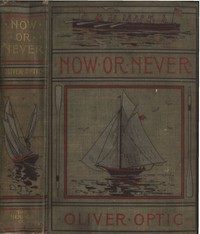Poor and Proud; Or, The Fortunes of Katy Redburn: A Story for Young Folks, Optic [best books to read now txt] 📗

- Author: Optic
Book online «Poor and Proud; Or, The Fortunes of Katy Redburn: A Story for Young Folks, Optic [best books to read now txt] 📗». Author Optic
"What shall I read?" asked Katy, who could with difficulty keep back the flood of tears that rose up from her heart.
"'Come, said Jesus' sacred voice.'"
Katy opened the book to the beautiful hymn commencing with this line, and in a voice broken by the emotion she could not wholly control, she read it through. The smile that played on her mother's face showed how deep and pure was the consolation she derived from the touching poetry. She could smile while racking pains tortured her frame, while her frail body seemed hardly to retain its hold upon mortality. How blessed the hope that pours its heavenly balm into the wounds of the sufferer!
Poor Katy was painfully impressed by the appearance and conduct of her mother. She had never before seen her so calm and resigned to those dreadful sufferings. She had heard her complain and murmur at her hard lot, and wonder why she should be thus sorely afflicted. She feared that some appalling event, which she dared not define and call by its name, was about to happen. She dared not think of the future, and she wondered that her mother could be so calm while she endured so much.
"Katy," said Mrs. Redburn, after the long silence that followed the reading of the hymn, "I feel very weak and ill. Take my hand."
"You are burning up with fever!" exclaimed Katy, as she clasped the hand, and felt the burning, throbbing brow of her mother.
"I am; but do not be alarmed, Katy. Can you be very calm?"
"I will try."
"For I feel very sick, but I am very happy. I can almost believe that the triumph of faith has already begun in my soul. The world looks very dim to me."
"Nay, mother, don't say so."
"I only mean that as heaven seems nearer, my hold upon earth is less strong. You must be very resolute, my child, for I feel as though the sands of life were fast ebbing out; and that in a few hours more I shall be 'where the wicked cease from troubling, and the weary are at rest.' If it were not for leaving you, Katy, I could wish to bid farewell to earth, and go up to my eternal home, even on this bright, beautiful Christmas day."
"O mother!" sobbed Katy, unable any longer to restrain the expression of her emotion.
"Do not weep, my child; I may be mistaken; yet I feel as though God was about to end my sufferings on earth, and I am willing to go."
"O, no, mother! It cannot be!" exclaimed Katy, gazing earnestly, through her tearful eyes, upon the pale but flushed cheek of the patient sufferer.
"I only wish to prepare you for the worst. I may get well; and for your sake, I have prayed that I may. And, Katy, I have never before felt prepared to leave this world, full of trial and sorrow as it has been for me. Whatever of woe, and want, and disappointment it has been my lot to confront, has been a blessing in disguise. I feel like a new creature. I feel reconciled to live or die, as God ordains."
"Do not look on the dark side, mother," sobbed Katy.
"Nay, child, I am looking on the bright side," returned Mrs. Redburn, faintly. "Everything looks bright to me now. Life looks bright, and I feel that I could be happy for many years with you, for you have been a good daughter. Death looks bright, for it is the portal of the temple eternal in the heavens, where is joy unspeakable. I am too weak to talk more, Katy; you may read me a chapter from the New Testament."
The devoted daughter obeyed this request, and she had scarcely finished the chapter before the girls came for their candy. She was unwilling to leave her mother alone even for a minute; so she sent one of them over to request the attendance of Mrs. Howard, and the good woman took her place by the side of the sufferer.
Katy, scarcely conscious what she was doing—for her heart was with her mother,—supplied each girl with her stock of candy, and received the money for it.
"You need not come to-morrow," she said to them, as they were departing.
"Not come!" exclaimed several. "What shall we do for candy?"
"We cannot make any now; my mother is very sick."
"I get my living by selling candy," said one of them. "I shan't have anything to pay my board if I can't sell candy."
"Poor Mary! I am sorry for you."
This girl was an orphan whose mother had recently died, and she had taken up the business of selling candy, which enabled her to pay fifty cents a week for her board, at the house of a poor widow. Katy knew her history, and felt very sad as she thought of her being deprived of the means of support.
"I don't know what I shall do," sighed Mary.
"I have to take care of my mother now, and shall not have time to make candy," said Katy.
"Do you mean to give up for good?" asked one of them.
"I don't know."
This question suggested some painful reflections to Katy. If they stopped making candy, she and her mother, as well as orphan Mary, would be deprived of the means of support. She trembled as she thought of the future, even when she looked forward only a few weeks. There was not more than ten dollars in the house, for they had but a short time before paid for their winter's coal, and at considerable expense largely replenished their wardrobes. The rent would be due in a week, and it would require more than half they had to pay it.
Katy was appalled as she thought of the low state of their purse, and dreaded lest some fearful calamity might again overtake them. It was plain to her that she could not give up her business, even for a week, without the danger of being again reduced to actual want. She therefore reversed her decision, and told the girls they might come as usual the next day.
When they had gone she shed a few bitter tears at the necessity which the circumstances imposed upon her of working while her heart revolted at the idea of being anywhere but at the bedside of her sick mother. Then she lamented that they had not dispensed with many articles of luxury while they had plenty of money, and saved more of it for such a sad time as the present. But it was of no use to repine; she had only to make the best of her situation.
Amid all these discouragements came a bright ray of sunshine—the brightest that could possibly have shone on the pathway of the weeping daughter.
Early in the forenoon came the physician who carefully examined his patient, speaking cheerfully and kindly to her all the while. The sufferer watched his expression very narrowly, as he bent over her and questioned her in regard to her pains. He looked very serious, which Mrs. Redburn interpreted as unfavorable to her recovery, not considering that he was engaged in profound thought, and therefore his countenance would naturally wear an earnest look. Presently she sent Katy to get her some drink, not because she wanted it, but to procure her absence for a short time.
"Do you think I shall get well?" asked Mrs. Redburn, as soon as the door closed behind Katy.
"A person who is very sick, is of course, always in danger, which may be more or less imminent," replied the doctor, with professional indirectness.
"I beg of you, doctor, do not conceal from me my true situation."
"I cannot foresee the result, my good woman."
"Do you think there is any hope for me?"
"Certainly there is."
"Tell me, I implore you, what you think of my case," pleaded the sufferer, in feeble tones. "I felt this morning that my end was very near."
"O, no; it is not so bad as that. I should say you had as many as five chances in ten to be on your feet in a fortnight."
"Do you think so?"
"I do not regard your case as a critical one."
"I wish you had told me so last night. It would have saved my poor child a very bitter pang."
"I was not aware that you thought yourself alarmingly sick, or I certainly should; for such an opinion on your part would do more to bring about a fatal result than could be counteracted by the most skilful treatment. A physician does not hold the issues of life and death; he can only assist nature, as the patient may by a cheerful view of his case. This is not your old complaint; you have taken cold, and have considerable fever; but I think it is a very hopeful case."
The return of Katy interrupted the conversation; but the doctor's opinion was immediately imparted to her, and it sent a thrill of joy to her heart.
"I was low-spirited this morning, Katy," said Mrs. Redburn, when the physician had gone. "I really felt as though my end was rapidly approaching. I am sorry I mentioned my thoughts to you."
"It was all for the best, I suppose," replied Katy.
But Mrs. Redburn was very sick; and even now the disease might have a fatal termination. The best of care would be required to restore her to health, and Katy was very anxious. Her mother was still suffering the most acute pain.
The doctor had left a prescription, and Katy was again obliged to call in Mrs. Howard while she went to the apothecary's to procure it; but the good woman declared she was glad to come, and would bring her work and stay all the forenoon. The medicine, when obtained, to some extent relieved the sufferer's pain.
As her presence was not required in the chamber, Katy went down-stairs to what she called the candy room. She had an hour or two to spare, and she put on the kettle with the intention of making a part of the next day's candy. She was nearly worn out by watching and anxiety, and not fit to perform such hard work; but weak and weary as she felt, her spirit was still earnest, and she resolutely commenced her labors.
At noon she had made half the quantity required. Mrs. Howard was then obliged to go home, and attend to her own family, for she had two children besides Tommy, who had not yet returned from the East Indies. Mrs. Redburn was very restless during the afternoon, and could not be left alone for more than a short time at once. Mrs. Howard had promised to come again in the evening, and make the rest of the candy; but Charley came home from school quite sick, seemingly threatened with the scarlet fever, so that she could not keep her promise. Mrs. Sneed, however, dropped in, and consented to remain for two hours, which enabled Katy to make the rest of the candy.
By this time the poor girl was completely worn out. Her resolute will, even, could no longer impart its strength to the body. Her mother worried sadly about her, and finally induced her to lie down on the bed by her side, on condition that she should be awakened in an hour. In this manner she obtained a few hours' sleep during the night; but these severe labors were a fearful task to be imposed upon a mere child.
The next day Mrs. Redburn, who could not fail to observe Katy's pale face and sunken eye, fretted so much about her that she was obliged to promise she would not attempt to make any more candy. Mrs. Howard's son was still very sick, so that she was unable to render much assistance. The rest of the neighbors, though kindly disposed, had their own families to care for, and could do very little for others.
With what slight aid her friends could afford, Katy struggled through a week, when Dr. Flynch appeared, and demanded the rent. There was but little more than money enough left to pay it, but Katy would not ask him for any indulgence, and paid him in full.
In a few days more the purse was empty. Katy's most dreaded hour had come. She had no money, and almost every day some new thing was required for her mother. But this time she had friends, and she determined to use them, as all true friends wish to be used in the day of sorrow and trial. After considerable debate with herself, she decided to apply to Mrs. Gordon for a loan of twenty dollars. She was still poor and proud, and she could not endure the thought of asking a loan, which might be regarded as a gift, or which, by her own inability to pay it, might virtually become such;





Comments (0)